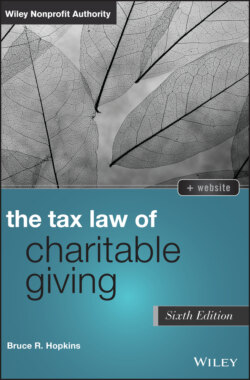Читать книгу The Tax Law of Charitable Giving - Bruce Hopkins R., Bruce R. Hopkins, David Middlebrook - Страница 92
§ 4.11 CONTRIBUTIONS OF STOCK OPTIONS
ОглавлениеFor-profit corporations may pledge stock options to charitable organizations. These transactions can generate tax law issues, particularly if the donee is a disqualified person with respect to the donor, such as by being a substantial contributor.54 These issues of law include the timing of the resulting charitable contribution deduction. This aspect of the law is reflected in an IRS private letter ruling.55
In this instance, a for-profit publicly traded corporation established a private foundation as its charitable giving vehicle. This corporation, being a substantial contributor to the foundation, was a disqualified person with respect to it. The corporation proposed to pledge to the foundation stock options for the purchase of shares of common stock of the corporation; the corporation did not receive any consideration for this pledge. The business purpose underlying the pledge was to further the charitable purpose of the foundation and other charitable organizations.
The options will be exercisable at a price specified in a stock option pledge agreement. This private foundation will not exercise the options directly because payment of the purchase price to the corporation would be an act of self-dealing.56 Rather, the foundation will either transfer the options to one or more unrelated public charitable organizations or engage in a cashless “net exercise” transaction with the corporation. Pursuant to this net exercise procedure, the holder of options would elect to receive shares of the corporation's stock in an amount equal to the net value of the options being exercised on the date of exercise. This net value of the options is calculated by subtracting the exercise price for the number of the options being exercised from the value of the shares that the holder would have received as the result of a direct exercise. If the holder were to elect the net exercise procedure, the holder would notify the corporation of the number of options being exercised, along with written notice of its election to use the procedure, and the corporation would issue to the holder the number of shares of the corporation's stock computed using a formula specified in the option pledge agreement.
The foundation may sell the stock options to an unrelated charity for a fair market value price, with the value of the option affected by the terms in the option pledge agreement. Alternatively, the foundation may grant options to an unrelated charity, with the grantee expected to exercise the options prior to their expiration.
The IRS ruled that the pledge of the stock options by the corporation to the foundation did not constitute self-dealing because of the absence of consideration and because of the charitable purposes to be served. The pledges are not extensions of credit.57 The net exercise procedure does not entail a sale or exchange, the IRS concluded, so there would not be self-dealing for that reason. The sale of an option by the foundation to an unrelated charity would not be self-dealing inasmuch as the cancellation of the enforceable pledge would be for consideration paid by a nondisqualified person or an entity not controlled by a disqualified person. The exercise of a stock option by an unrelated charity also would not constitute self-dealing.
Stock options are not assets susceptible of use to produce interest, dividends, rents, or royalties. Thus, the proceeds received by the foundation from the sale of stock options to an unrelated charity would be excluded from the computation of the foundation's net investment income for tax purposes.58 The IRS ruled that the gain on the sale of stock options would be excluded from the computation of the foundation's unrelated business income.59
The IRS ruled that, if the foundation transfers the options to an unrelated charitable organization and that charity engages in a cash exercise of the options, the corporation will be entitled to a federal income tax charitable deduction only on the exercise of the options by the unrelated charity. Moreover, the agency held that this deduction will be for an amount equal to the difference between the exercise price and the fair market value of the corporation's stock transferred on the exercise. The IRS also ruled that, if the foundation engages in a net exercise of the options, the corporation will be entitled to a charitable contribution deduction only at the time of the exercise. This deduction will be for an amount equal to the fair market value of the corporation's stock transferred to the foundation on the exercise. The IRS further ruled that, if the foundation transfers the options to an unrelated charity and that charity engages in a net exercise of the options, the corporation will be entitled to a charitable deduction only at the time of the net exercise. This deduction will be for an amount equal to the fair market value of the corporation's stock transferred to the charitable organization on the net exercise.
